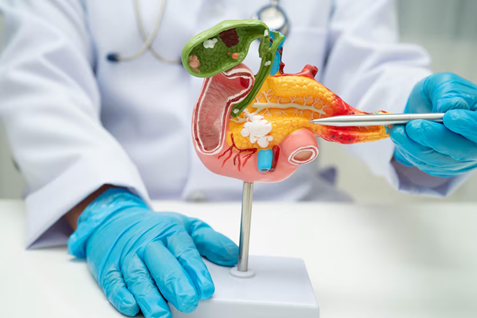The pancreas is a vital organ in the digestive system, responsible for producing enzymes that aid in digestion and hormones like insulin that regulate blood sugar. When the pancreas becomes inflamed, a condition called pancreatitis occurs.
At Complete Gastro Care, we specialize in the accurate diagnosis and advanced treatment of pancreatitis, helping patients recover and maintain long-term health.
What Is Pancreatitis?
Pancreatitis is the inflammation of the pancreas and can occur in two primary forms:
- Acute Pancreatitis: This is a sudden inflammation of the pancreas that typically resolves within a few days to weeks. While mild cases can be managed effectively, severe cases may lead to life-threatening complications.
- Chronic Pancreatitis: This is a long-term condition where the pancreas is continuously inflamed, often leading to permanent damage, scarring, and loss of pancreatic function.
Causes of Pancreatitis
There are several factors that can lead to pancreatitis, including:
- Gallstones: These can block the pancreatic duct, causing enzyme buildup and inflammation.
- Alcohol Consumption: Excessive alcohol intake is one of the leading causes of both acute and chronic pancreatitis.
- High Triglycerides: Elevated fat levels in the blood can contribute to inflammation.
- Medications: Certain drugs may have side effects that trigger pancreatitis.
- Genetic Conditions: Hereditary factors, such as cystic fibrosis or genetic mutations, may predispose individuals to pancreatitis.
- Autoimmune Disorders: Conditions where the immune system attacks the pancreas.
Symptoms of Pancreatitis
The symptoms of pancreatitis vary depending on whether the condition is acute or chronic.
Acute Pancreatitis Symptoms:
- Severe abdominal pain, typically in the upper abdomen, which may radiate to the back
- Nausea and vomiting
- Fever
- Rapid heart rate
- Swollen or tender abdomen
Chronic Pancreatitis Symptoms:
- Persistent upper abdominal pain
- Unintended weight loss due to poor digestion
- Fatty, oily stools (steatorrhea) caused by inadequate enzyme production
- Diabetes may develop as a result of pancreatic damage
If you experience any of these symptoms, seeking prompt medical attention is critical. At Complete Gastro Care, our expert team provides comprehensive evaluations to determine the underlying cause of your symptoms.
Diagnosing Pancreatitis
At Complete Gastro Care, we utilize advanced diagnostic tools to confirm a pancreatitis diagnosis:
- Blood Tests: Elevated levels of pancreatic enzymes (amylase and lipase) may indicate inflammation.
- Imaging Studies: Ultrasound, CT scans, or MRI are used to detect gallstones, blockages, or structural abnormalities.
- Endoscopic Tests: Procedures like ERCP (Endoscopic Retrograde Cholangiopancreatography) help identify and address ductal obstructions.
Treatment Options for Pancreatitis
The treatment for pancreatitis depends on the severity and underlying cause of the condition.
- Acute Pancreatitis Treatment:
- Hospitalization: Severe cases often require hospitalization for IV fluids, pain management, and nutritional support.
- Gallstone Removal: If gallstones are the cause, endoscopic or surgical removal may be necessary.
- Lifestyle Modifications: Avoiding alcohol and eating a low-fat diet can help prevent recurrence.
- Chronic Pancreatitis Treatment:
- Enzyme Supplements: Pancreatic enzyme replacements improve digestion and nutrient absorption.
- Pain Management: Medications or nerve block procedures may help control chronic pain.
- Surgery: In some cases, surgery may be needed to remove damaged tissue or address complications.
- Diabetes Management: Insulin therapy may be required if the pancreas no longer produces enough insulin.
At Complete Gastro Care, we provide individualized treatment plans to ensure optimal recovery and management of pancreatitis.
Preventing Pancreatitis
While not all cases of pancreatitis can be prevented, certain steps can reduce the risk:
- Maintain a healthy diet low in fat and rich in fruits and vegetables.
- Limit or avoid alcohol consumption.
- Keep triglycerides and cholesterol levels under control.
- Manage gallbladder health to prevent gallstone formation.
- Avoid smoking, which increases the risk of pancreatic inflammation.
Why Choose Complete Gastro Care?
At Complete Gastro Care, our team of experienced gastroenterologists and specialists is dedicated to providing exceptional care for patients with pancreatitis. With cutting-edge diagnostic tools and evidence-based treatment protocols, we ensure that each patient receives personalized care tailored to their condition.
Our holistic approach includes not only medical and surgical treatment but also patient education and long-term support to prevent recurrence and improve overall quality of life.
Take the First Step Toward Better Digestive Health
If you or a loved one is experiencing symptoms of pancreatitis, don’t delay seeking expert care. At Complete Gastro Care, we are here to guide you through every step of your journey to recovery. Schedule a consultation with our specialists today and let us help you take control of your health.

